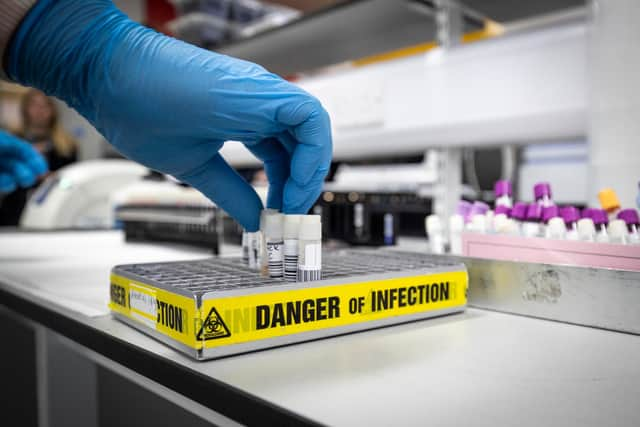Medical expert explains why Sheffield can do more coronavirus tests than other areas
and live on Freeview channel 276
Dr Andrew Lee, a reader of public health at Sheffield University, previously said the city is “lucky” thanks to the “phenomenal” amount of testing taking place at its hospitals.
Nationally, however, the Government has been criticised for not testing enough – particularly among frontline medical and care staff – amid a shortage of testing kits.
Advertisement
Hide AdAdvertisement
Hide AdMass testing is seen by many health experts as crucial to work out how far the virus has spread, diagnose people, and inform any future lockdown strategy.


So, why have hospitals in Sheffield been able to test more people, and why can’t hospital trusts in other areas do the same?
Dr Lee said: “The first point to make is that not all hospitals are equal. Many people don't realise Sheffield Teaching Hospitals is one of the biggest hospital trusts in the country.
“Local district hospitals tend to be smaller and serve just their local area. Sheffield on the other hand is a regional centre with specialist services, including virology and some laboratory services, for South Yorkshire, North Derbyshire – and some services beyond – serving about one million people.
Advertisement
Hide AdAdvertisement
Hide Ad“It has a bigger microbiology/virology service, more kit and staff. It has a first class infectious disease unit that is set up as one of the few national centres for High Consequence Infectious Diseases, which is why the first few infected persons from the Diamond Princess cruise ship were taken there to be hospitalised. And it does a lot of research, too, which in turn means more infrastructure and staff.”
Virology is the branch of science that deals with the study of viruses.
Dr Lee added: “So, in a nutshell it's got more infrastructure than your typical district hospital. They've taken a decision to extend testing to staff earlier on, some weeks ago, which other areas did not. And like all things, the hard work of their staff.
“There is also a separate side story of a national shortage of consultant microbiologists, who study viruses, that has been going on for a few years. So, many local district hospitals may not be up to full staffing. And there has been an increasing trend to consolidate microbiology services into regional centres, which again depletes some local areas.”
Advertisement
Hide AdAdvertisement
Hide AdSheffield Teaching Hospitals Trust currently has the capacity to conduct 1,000 tests every day. A spokesperson for the Trust said they hope to be able to increase the capacity to 2,000 by next week.
The spokesperson added that the Trust was already prepared for flu testing, which meant they had the necessary “equipment, expertise and knowledge” to begin testing for coronavirus.
This is another reason why they were able to test more people at an earlier date – and why the number of confirmed coronavirus cases in Sheffield was initially higher than many other areas in the UK, including those with larger populations.